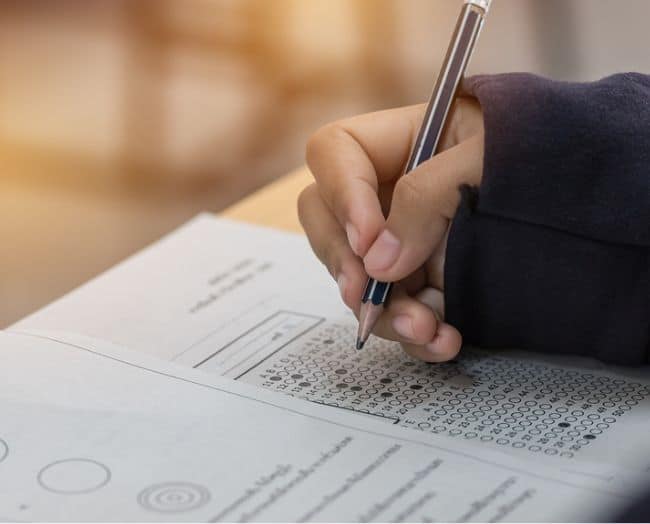
Cheating: 3 Main Causes and How to Fix Them
Cheating: 3 Main Causes and How to Fix Them
Cheating is a universal classroom issue. The ways to cheat are endless. From passing notes to searching on Google, students have crafted some very clever ways to find the answers they need.
Since schools went remote in March of 2020, cases of cheating are on the rise. Students have more independence and less accountability. They no longer have their teachers lurking over their shoulders to keep them out of the clutches of academic dishonesty. In fact, a recent study cited a nearly 200% increase in the use of the homework help site, Chegg, especially among STEM students.
Lack of accountability isn’t the only reason students are tempted to cheat. Laziness and apathy are also high on the list. However, if a student is cheating, there is usually a bigger problem at hand.
This blog will focus on the top three reasons students cheat and how to fix the underlying issues once and for all.
#1. They aren’t seeing any improvement to their grade.

Imagine that you completed all of your assignments only to receive not so great marks. So you make a plan to improve your grade. You take advantage of tutoring hours, redo coursework, and resubmit your new efforts. After all your hard work you go to check your grade, but it’s the same as it was before. Frustrating, right?
Frustration and pressure are two of the top reasons why students cheat. If they are working really hard but not seeing a payoff, then they’ll be more inclined to take the easy route to an A.
For middle school students applying to private schools or juniors and seniors in high school who are applying to college, grades matter.
Within the school setting, GPA and class rank are what make students stand apart from each other academically. Therefore, much importance is placed on making sure grades are as close to perfect as possible, especially for high achieving students who aren’t used to failing and want to keep their reputation as top of the class intact.
For students who come from households with high academic expectations, the pressure is even bigger. They don’t want to disappoint their parents with low grades.
Any way you look at it, the true reasons why students cheat for a better grade aren’t about getting an A. It’s about feeling the pressure to meet a certain expectation and feeling frustrated when they don’t.
From Cheating to Thriving: Take the Pressure Off
If your child is cheating because they feel pressure or frustration:
- Stress that an A means nothing if they haven’t actually learned anything. Talk to them about how knowledge and skills are more important than the grade they earn.
- Lessen the amount of competition that your student is engaged in. Maybe they need a break from sports or academic extracurriculars for a bit to help them unwind their competitive edge.
- Explain to them how growth can be slow and that with a good plan in place, like a tutor or good study habits, they will see academic gains in no time.
#2. They waited until the last minute to do the assignment.

In my time as an educator, I’ve found that one of the biggest reasons as to why students cheat is procrastination. If you give a student a month to write a research paper, they inevitably wait until the night before the assignment is due to even consider putting words to the page. Usually at this point, they are overwhelmed by the workload and have two options: don’t hand in the assignment at all or cheat.
But why did they put off doing the assignment in the first place?
The answer to this question can be broken down into two main reasons: they were afraid and overwhelmed or they had a lot on their plate and mismanaged their time.
High achieving students are often times perfectionists. They want to do everything right, and they don’t want to disappoint anyone. This pressure causes massive anxiety. The irony of perfectionists is that they are so afraid of failing or doing something wrong, that they end up not even starting until it’s too late. This is when they are forced to find other ways to get the work done.
On the other hand, some students are just busy with activities like sports, academic extracurriculars, or responsibilities at home. These students need to be very selective with how they budget their time. This can become a problem when the essay they thought it would take an hour to write ends up taking two or three.
Unfortunately, in both situations if the student waits until last minute to do the assignment, cheats, and ends up with a good grade, this can lead to a vicious cycle of procrastination.
From Cheating to Thriving: Teach your child time management skills.

If your child is cheating because they have trouble managing their time:
- Have your child make a list of activities and assignments they need to complete, then have them number each one from most important to least.
- Sit down with your child and make a schedule. You as the adult have a more realistic understanding of how much time certain activities will take versus others.
- Help your child break down bigger assignments like projects and research papers into smaller chunks. You can do this by scheduling out a specific time each day that they will devote to working on these assignments, so that they aren’t leaving the whole thing until the day before it’s due.
#3. They are burnt out.

This is the reason I have heard students cite most often throughout this school year when asked why they cheat.
A survey of 11,000 high school students across the nation showed a 56% increase in stress levels among all students with a 51% increase in workload.
The pandemic has been difficult for everyone. Students dealt with the struggle of online learning while sacrificing milestone events like prom and graduation.
For some students, opportunities to go out and see friends were limited. Other rewards for hard work, like taking vacations, were significantly reduced. All the while teachers have been piling on the work.
The stress of working hard combined with minimal social outlets and breaks to relieve that stress have made a breeding ground for burn out. And when students burn out, they turn to cheating to make life easier.
From Cheating to Thriving: Teach your child the importance of good mental health practices.

If your child is struggling with burn out:
- Talk to them about how they are feeling. It is very important that you give your child a safe space to express their emotions and show them that you understand how they feel.
- Make sure that they are taking breaks through out the day to do something they enjoy. Whether it’s to go outside or to read a book, explain to your child that having a hobby outside of school is just as important as getting their assignments done.
- Create a “shut down” time for your child. During this time, they should log off the computer and do activities they enjoy. This is a time for your child to rest and recharge in order to be refreshed and ready for the next day.
Next Steps
Remember, you must help your child build good work habits in order for them to succeed in the classroom. If you don’t fix their bad habits now, they will end up paying for it later. Don’t let the bad habits of today sneak up on your child down the road!
Want individualized guidance and support? Our expert academic counselors are ready to help. Contact us today to learn more and schedule an academic evaluation to find the best MEK program for your child!
We look forward to working with you!



